#YHVH
Text
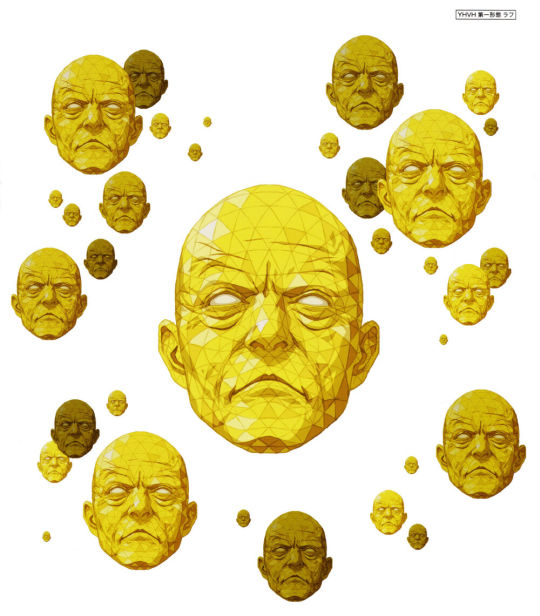
#YHVH#Shin Megami Tensei#smt#smt yhvh#yhvh smt#megami tensei#megaten#adoption poll#image submitted#tags submitted
16 notes
·
View notes
Text
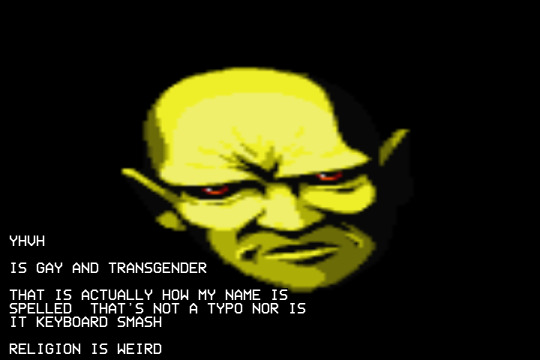
#yhvh#smt#shin megami tensei#every character is gay and trans#gay#lgbt#lgbtq+#lgbtq#trans#transgender
20 notes
·
View notes
Text
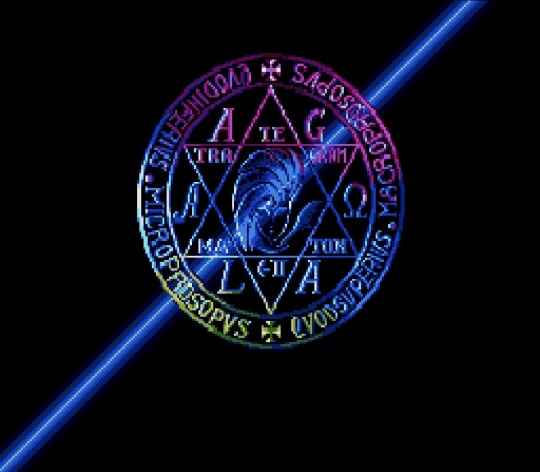
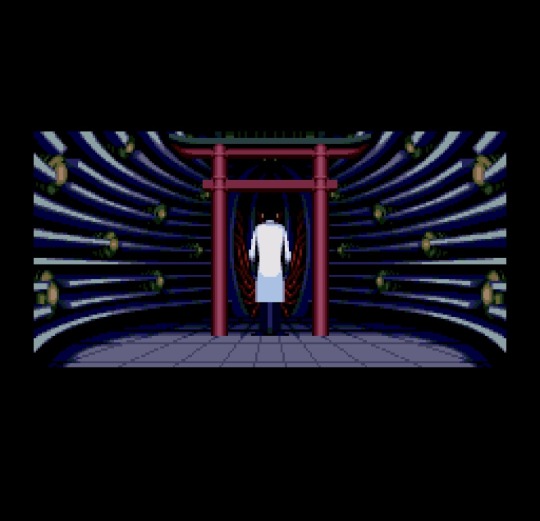

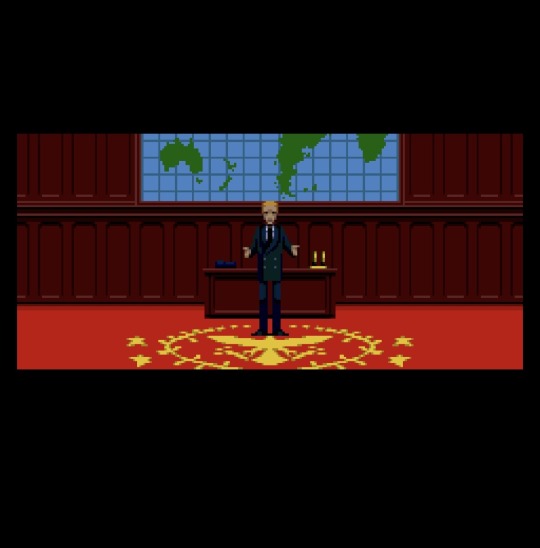
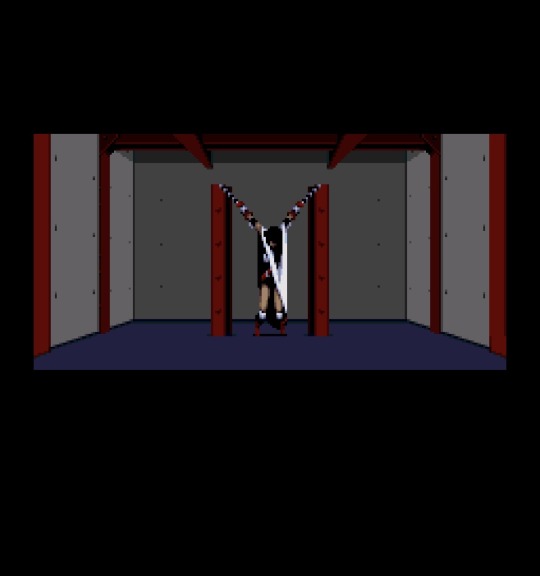

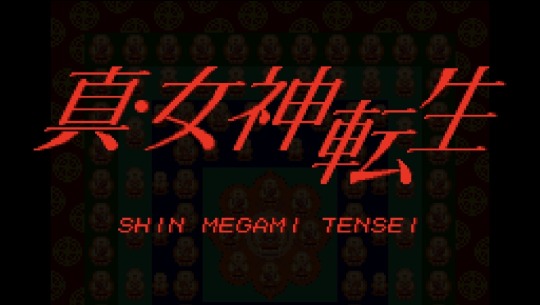
'EL ELOHIM ELOHO ELOHIM SEBAOTH'
'ELION EIECH ADIER EIECH ADONAI'
'JAH SADAI TETRAGRAMMATON SADAI'
'AGIOS O THEOS ISCHIROS ATHANATOS'
'AGLA AMEN'
SHIN.MEGAMI.TENSEI
9 notes
·
View notes
Text
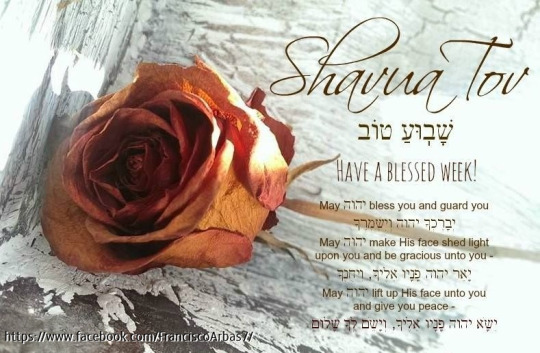
BE ENCOURAGED. . . HAVE A BLESSED WEEK!
Jud 1:24 Now, to the one who can keep you from falling and set you without defect and full of joy in the presence of his Sh'khinah—
Jud 1:25 to YHVH alone, our Deliverer, through Yehoshua the Messiah, our master—be glory, majesty, power and authority before all time, now and forever. Umnam.
#thewayofyehoshua#yeshua#torah#yehovah#people of the way#yeshua messiah#yehoshua#hebrew#yhvh#NETZARI JUDAISM
8 notes
·
View notes
Text
#songs to fight God to#this boss fight took me so long i swear i still hear this track in my dreams even tho i played the game like 4 years ago#smt iv apocalypse#smt iv#megaten#shin megami tensei#music#yhvh#savleye
21 notes
·
View notes
Text
TUMBLR COMPLETE MONSTER TOURNAMENT!
Come next October 1st, Tumblr will vote to decide which villain is the vilest of them all! Of these 36 contenders, only one of them can be named the evilest Monster on Tumblr!

Here is the criteria on which our contestants shall be judged:
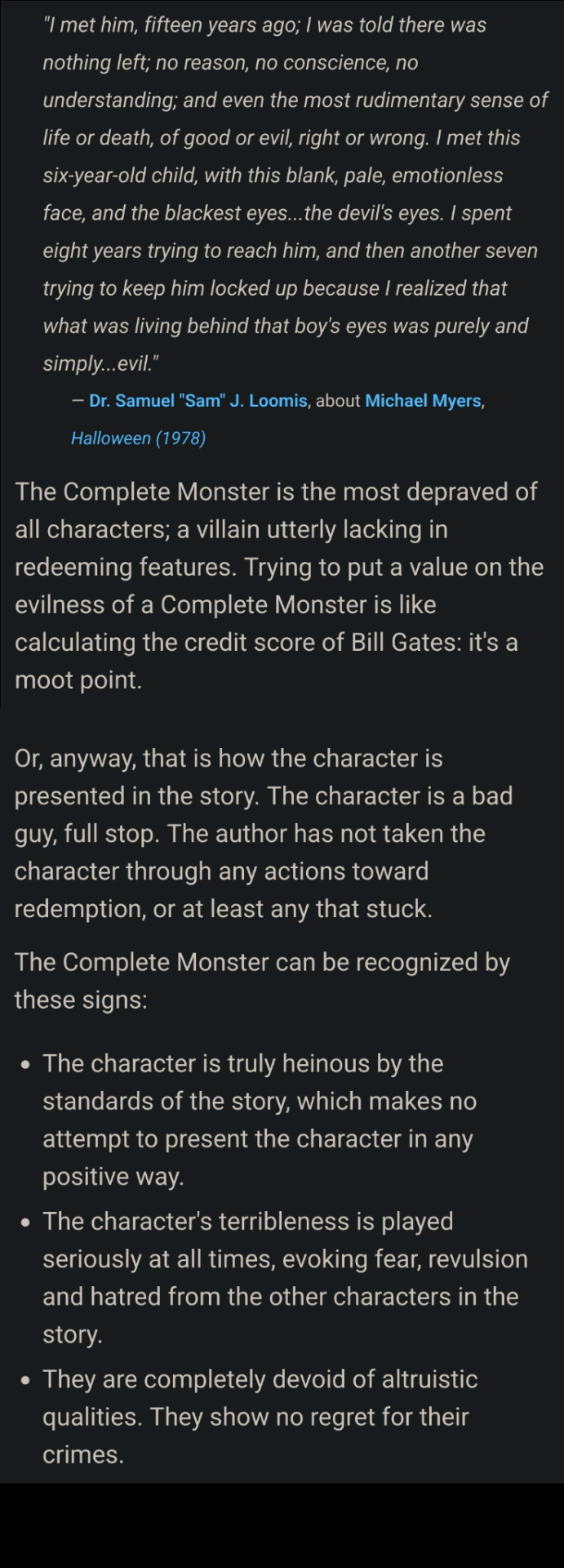
While several of these characters have a vast resource and scale disparity between them, try and ask yourself this: if the character with less resources could commit all the atrocities of the character with more resources, or even go beyond them, would they?
Contenders:
Round 1: Darkseid (DC Comics) vs Nyarlathotep (The Lovecraft Mythos)
Round 2: Kefka Palazzo (Final Fantasy) vs The Joker (DC Comics)
Round 3: Dimentio (Super Mario Bros) vs Bill Cipher (Gravity Falls)
Round 4: Lord English (Homestuck) vs YHVH (Shin Megami Tensei)
Round 5: The Scarlet King (SCP Foundation) vs The Crimson King (The Dark Tower)
Round 6: The Lich (Adventure Time) vs Vilgax (Ben 10)
Round 7: Skynet (The Terminator) vs AM (I Have No Mouth And I Must Scream)
Round 8: Sauron (The Lord of the Rings) vs Red Skull (Marvel Comics)
Round 9: Carnage (Marvel Comics) vs Junko Enoshima (Danganronpa)
Round 10: The Radiance (Hollow Knight) vs Fire Lord Ozai (Avatar: The Last Airbender)
Round 11: Jonas Venture Sr. (The Venture Bros.) vs Masayoshi Shido (Persona)
Round 12: Palpatine (Star Wars) vs Frieza (Dragon Ball)
Round 13: Albert Wesker (Resident Evil) vs Dio Brando (JoJo's Bizarre Adventure)
Round 14: Vladimir Makarov (Call of Duty) vs Light Yagami (Death Note)
Round 15: Johan Liebert (Monster) vs Slenderman (Slender)
Round 16: Freddy Krueger vs Michael Myers
Round 17: Spongebob SquarePants (The Bikini Bottom Horror) vs Kirby (There Will Be Brawl)
Round 18: The Major (Hellsing) vs Jonah Magnus (The Magnus Archives)
Round 19: Slappy (Goosebumps) vs Chucky (Child's Play)
Round 20: William Afton (Five Nights at Freddy's) vs Martin Greywhinder (Harmony and Horror)
Round 21: Kefka Palazzo vs Nyarlathotep vs Bill Cipher
Round 22: Lord English vs The Scarlet King
Round 23: AM vs The Lich vs Sauron
Round 24: Junko Enoshima vs Fire Lord Ozai
Round 25: Frieza vs Jonas Venture Sr vs Dio Brando
Round 26: Vladimir Makarov vs Johan Liebert
Round 27: Spongebob SquarePants vs Freddy Krueger vs Jonah Magnus
Round 28: Slappy vs Martin Greywhinder
#complete monster#cm: irredeemable#cm tournament#darkseid#lovecraft mythos#nyarlathotep#kefka palazzo#final fantasy#the joker#dimentio#super mario bros#bill cipher#gravity falls#lord english#homestuck#yhvh#shin megami tensei#the scarlet king#scp foundation#the crimson king#the dark tower#the lich#adventure time#vilgax#ben 10#skynet#am ihnmaims#sauron#the lord of the rings#evilcore
38 notes
·
View notes
Text
giggling smiling twirling my hair and kicking my feet in the air doodling little hearts around the archaic name of God in the ancient clay tablets
15 notes
·
View notes
Text
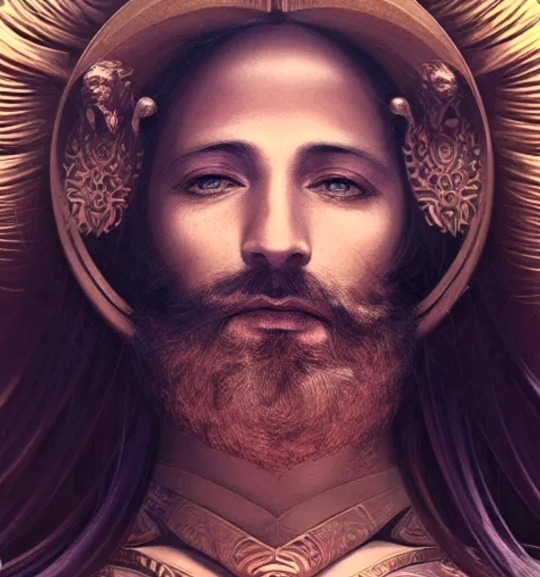
6 notes
·
View notes
Text
SMT IV/A cast Pokémon teams part 2






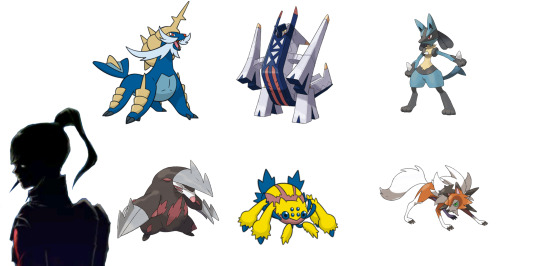
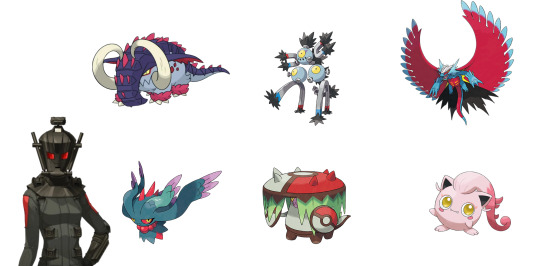


There’s a reason YHVH doesn’t have Arceus. I’ll explain it later.
#shin megami tensei#smtiv#smt4a#smt iv final#smt iv apocalypse#pokémon#nanashi smt#Asahi smt#Gaston smt#hallelujah smt#Toki smt#Akira smt#yuriko#black samurai#tayama#yhvh#my crappy edit
6 notes
·
View notes
Text

Follow us on Tumblr.
#bible#twitter#pinterest#facebook#etsystore#yhwh shirt#yahweh#yehova#yhvh#yhwh#YHWH Hat#YHVH Hat#Hat#Denim#God Hat#God#Jesus#Jesus Christ#Jesus Christ Hat
7 notes
·
View notes
Text
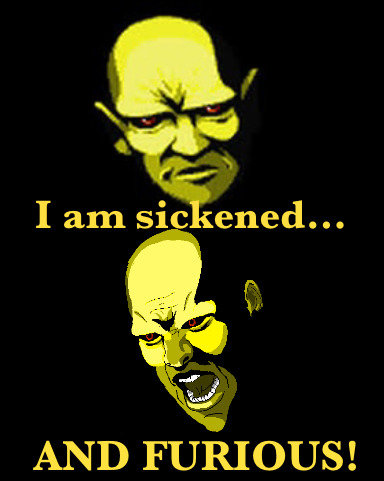
When some kid decides to go after your throne.
7 notes
·
View notes
Photo

7 notes
·
View notes
Text
DIVINE PATTERN IN THE TORAH
This fantastic treasure we call the Bible is a library of mystery, miracles, and life-changing principles, communicated through multiple genres and a variety of literary techniques. Forty authors wrote 66 books, over 1,500 years of writing, while expounding on 7,000 years of human history, technology, and prophecy, yet supernaturally revealing only one central focus. What is the primary revelation of the Bible? When we read the words of this fascinating and awe-inspiring library of divine literature, we discover the Creator of the Universe, who desires to have an intimate relationship with all of His creation.
We believe that the first author out of 40 that God used to begin this journey of knowing him intimately was Moses, who wrote the Torah's five books, the first five books of our Bible. God revealed Himself through the Hebrew tongue, which is dynamic versus static and focused on function over form. For 40 years, Moses would communicate these dynamic words that he heard from God in the "cleft of the rock" on Mount Sinai. He was commanded to make everything according to the "pattern" that God had shown him. Even unique patterns in the Torah can reveal prophetic events that would take place in the future. Let me give you an example of one of the most fascinating patterns that God reveals about himself in the five books of Moses.
We will begin with the meaning of the word Torah. It's often translated as "law," while "instruction" is a better translation." The Law of Moses is actually the law or instruction of God, who wants to teach His sons and daughters how to draw close to Him. Yes, He did give this revelation to the nation of Israel, which has protected it for 3500 years, with the intent that they would be a "light to the nations" and prepare the world for the Coming Messiah. It was through the Torah that Moses that gave Israel where the disciples of Jesus discovered who He really was. Philip told Nathaniel, "We have found the one who Moses in the law and also in the prophets wrote about" (John 1:45).
Torah has only four letters in Hebrew, considered consonants, written from right to left: Tav ת, Vav ו, Reish ר, Heh ה. The letter Vav ו, normally transliterated as a "v," is used as a vowel by placing a dot on top to represent the "o" vowel. So the Hebrew letters for the word "Torah" would be spelled with four letters transliterated as T-O-R-H.
Genesis - First Book of the Torah
If you start with the word "Bereshit," translated "In the beginning...", in Genesis 1:1, you will find the first of the four letters for Torah: Tav ת. Count 49 letters, and you will discover the second letter Vav ו. Again, count 49 letters to the third letter Resh ר, and finally, count 49 letters to the fourth letter, Heh ה. What does that spell? Torah, תֹּורָה.
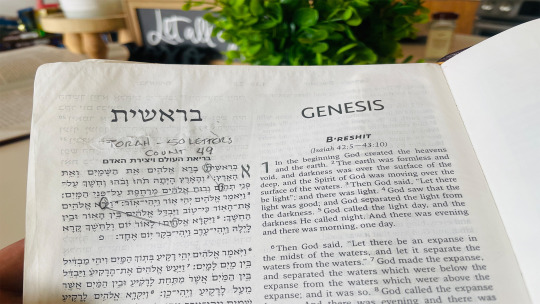
Exodus - Second Book of the Torah
Now we will go to Exodus 1:1, and look for the letter Tav ת again, which we find as the last letter of "Sh'mot," translated as "names." Now count 49 letters to the letter Vav ו, another 49 letters to the letter Resh ר, count 49 letters to Heh ה again, and of course, we read the word Torah, תֹּורָה.
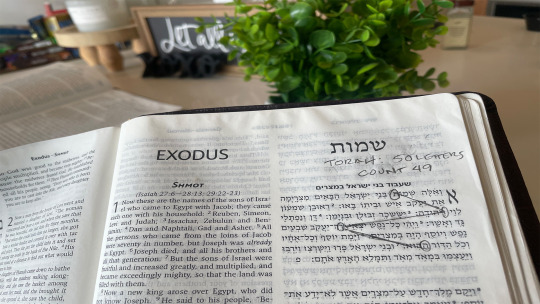
Leviticus - Third Book of the Torah
The pattern we see in these first two books of the Torah point toward Leviticus, which has its own unique message. Instead of reading the word "Torah" תֹּורָה with intervals of 49 letters, we discover the name of God with intervals of seven letters in between. What is the name of God? While God seems to have many "names" describing what He has done or who He will reveal Himself to be throughout Scripture, there is only one self-revealed name that He gives humanity that perfectly describes His divine essence and eternal nature. This sacred name for our Creator comes from a verb of existence (hayah היה - "was"), which means 'He who always was, is or exists presently, and will always be or exist in the future." This dynamic verb of action also speaks of our Creator who brings all things into existence, and is spelled with four letters in Hebrew: יְהוָה : Yud י, Heh ה, Vav ו, Heh ה [YHVH].
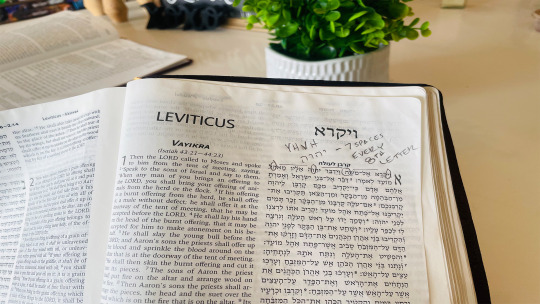
Numbers - Fourth Book of the Torah
Beginning in Numbers 1:1, the pattern is in a reverse order: ת,ו,ר,ה instead of ה,ר,ו,ת. So we discover the last letter of the word "Torah," Heh ה, count 49 letters to Resh ר, count 49 letters to Vav ו, and another 49 letters to the first letter Tav ת. We now read Torah תֹּורָה backward, as if it points back to Leviticus.
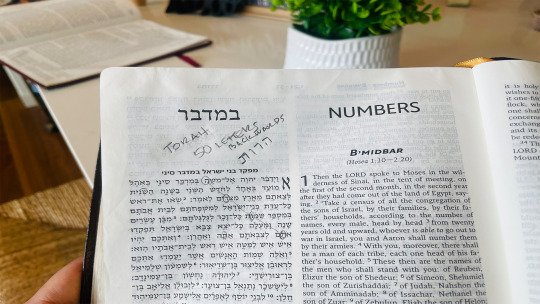
Deuteronomy - Fifth Book of the Torah
We discover the same phenomenon in Deuteronomy 1:5, where the pattern is in a reverse order: ת,ו,ר,ה instead of ה,ר,ו,ת. This time, instead of counting 49 letters, in this last book of the Torah, we must count 48. The starting letter Heh ה is found in front of the word Torah, or "law" (HaTorah), as a prefix for "the" in the phrase, "Moses began to explain this (or "the") law." Now we begin by counting 48 letters from Heh ה to the third letter Resh ר, then 48 letters to the second letter Vav ו, and then 48 letters to the first letter Tav ת. Again, we now read Torah תֹּורָה backwards, pointing back to Leviticus which we learned has the pattern of counting seven letters instead of 49, or 48, to spell the sacred name of God, YHWH or YHVH יְהוָה : Yud י, Heh ה, Vav ו, Heh ה.
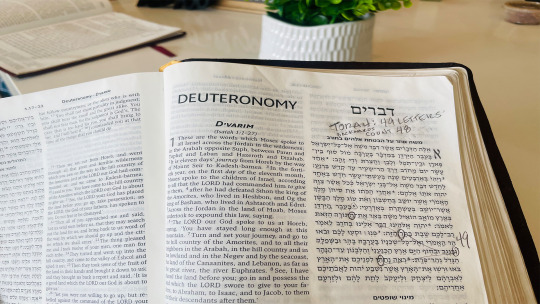
YHWH
Tetragrammaton – The Ineffable Four-Lettered Name of God. Tetragrammaton (from Greek tetragrammaton, meaning "four letters") refers to the Hebrew theonym (transliterated to the Latin letters YHWH, or YHVH; "Yud-Heh-Vav-Heh" יְהוָה] are the letters in Hebrew. It is derived from the verb that means "to be" or "exist" and is considered in Judaism to be the proper name of the God of Israel used in the Hebrew Bible. While YHWH is the usual transliteration of the Tetragrammaton in English academic studies, the alternatives YHVH, JHVH, and JHWH are also used. The most widely accepted guesstimation of the pronunciation of the Tetragrammaton (YHWH) is "Yahweh," though "Jehovah" is used in many Bibles but in few modern ones. Neither forms are exact. As religiously observant Jews are forbidden to say or write the Tetragrammaton in full, when reading the Torah, they use the term Adonai [Lord or Master], or HaShem [“The Name”]. Even though most Christians feel no prohibition on vocalizing the Tetragrammaton, in most Christian translations of the Bible, "LORD" is used in place of the Tetragrammaton, after the Hebrew word Adonai, and is often written with small capitals (or in all caps) to distinguish it from other words translated as "Lord."
You might be asking, "What is the significance of all of this?" This unique Bible code or equal letter distance that we discover intervals of either 50 letters or 49 all point to the middle book of sacrifice, Leviticus. This priestly Manuel of worship teaches us the importance of atonement and the blood of a sacrificial animal being used on behalf of Israel to draw them close to God. The sacrifices in the system had no power to save. Honestly, they were never intended to save the Israelites spiritually, but more importantly, to instruct them. All the "types and shadows," peculiar patterns, and detailed commandments were teaching tools to reveal the closeness of God and the intimacy we can experience as His children.
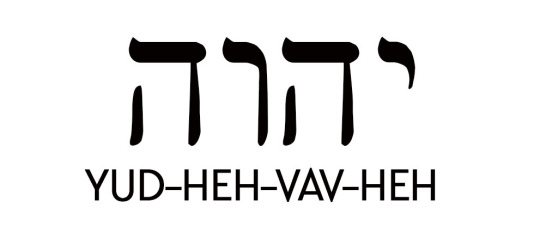
The Significance of This Discovery:
The Torah, whether reading from Genesis and Exodus or backwards from Numbers and Deuteronomy, points us toward the need for the LORD's sacrifice as an atonement of our souls (Leviticus 17:11). In fact, the middle words of the book of Leviticus, which is the middle of the Torah, also reveal a Bible code, found in Leviticus 10:16, Where Moses was searching for the sin offering. It says in Hebrew, "Darosh, Darash" דָּרֹשׁ דָּרַשׁ or "in searching, he searched." We must keep searching diligently to discover the ultimate sacrifice of the Lamb who was slain before the foundation of the world. Jesus (Yeshua in Hebrew), our Anointed Messiah, is the Lamb of God who took away the world's sin through His atonement. He is the Word of God, "divine Logos," or "living Torah," who became flesh and dwelt (or "tabernacled") among us, and we beheld His "Shekhinah glory," the very glory of the Father in heaven. He became our salvation because He was willing to become the LORD's [YHVH] sacrifice.
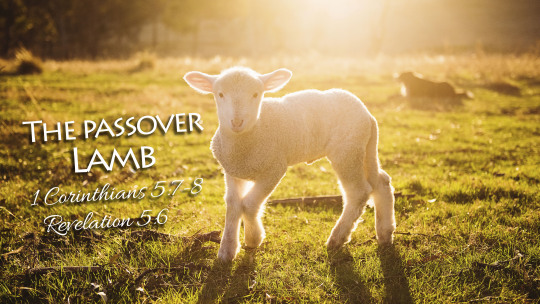
Shalom In Messiah,
Rabbi Brian Baruch Bileci
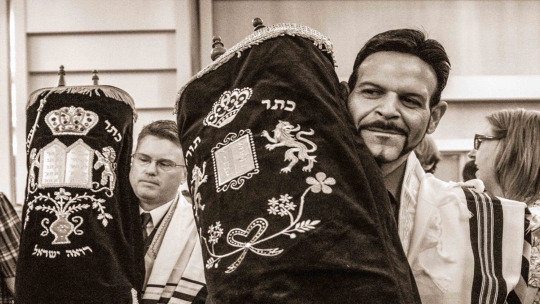
18 notes
·
View notes
Note
Honestly as someone who did edits on the wiki back the. I wasn’t sure if that was true myself, mostly as there was…stuff of dubious validity on some Japanese websites that did mention those games.
this is the true, unblemished nature of online. wikis are still full of bullshit but it's mostly like, specious interpretations. you don't get a lot of outright hoaxes these days. makes me nostalgic
4 notes
·
View notes
Text
His name is Yehoshua
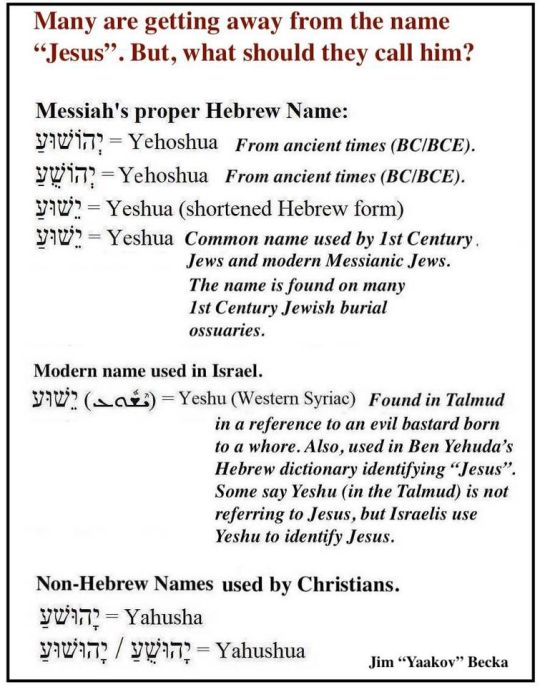
#thewayofyehoshua#yeshua#yehovah#torah#yeshua messiah#yhvh#messianic judaism#yehoshua#people of the way#hebrew
16 notes
·
View notes
